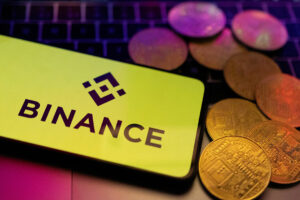




January Economic Update: Growth slows, prices rise
 DOWNLOAD
DOWNLOAD

Inflation Update: Up, up, and away?
 DOWNLOAD
DOWNLOAD

Quarterly Economic Growth Release: Growth takes on a slower pace
 DOWNLOAD
DOWNLOAD


SEC asks NTC to block Binance in Philippines

The Philippines is blocking access to the world’s largest cryptocurrency exchange Binance, which the Securities and Exchange Commission (SEC) says has been operating in the country without a license.
During its March 12 meeting, the Commission en Banc approved the filing of a formal request with the National Telecommunications Commission (NTC) to help block Binance’s website and its other web pages, the SEC said in a statement.
“The SEC has identified the aforementioned platform (Binance) and concluded that the public’s continued access to these websites/apps poses a threat to the security of the funds of investing Filipinos,” SEC Chairperson Emilio B. Aquino said in the letter addressed to the NTC.
The latest move comes after the SEC issued an advisory on Nov. 28, 2023, warning the public against investing in Binance. At that time, it said the removal of access to Binance would take effect within three months to give time for Filipino users to exit the exchange.
“Binance, however, has not secured from the SEC a license to solicit investments from the public, nor to create or operate an exchange for the buying and selling of securities, as required by Republic Act No. 8799, or The Securities Regulation Code (SRC),” the regulator said.
The SEC noted that Binance has conducted promotional campaigns on social media to encourage Filipinos to invest and trade on its platforms. Binance’s app is also available on Google Play Store and the Apple App Store.
Binance is described as the largest cryptocurrency exchange in the world, with more than 183 million members. It has an average daily trading volume of USD 65 billion covering over 402 cryptocurrencies.
“Considering the size and volume of Binance’s operations, however, the SEC ensured that the investing public would have enough time to exit the platform and reposition their portfolio in favor of authorized investment products and platforms,” the regulator said.
The SEC has also previously asked Google and Facebook operator Meta to prevent Binance’s online advertisements from targeting users in the Philippines.
“This is similar to moves by other regulators in other countries, amid prudence by local regulators to uphold the best interests of the investing public. However, there may be some disruptions to those with accounts locally,” Rizal Commercial Banking Corp. Chief Economist Michael L. Ricafort told BusinessWorld via Viber message.
Mr. Ricafort said Binance would need to get a license from the SEC. “That is the fundamental requirement for all investments in the country,” he added.
The SEC previously warned that salesmen, brokers, dealers or agents, representatives, promoters, recruiters, influencers, endorsers, and enablers of Binance may be held criminally liable under the SRC and could face a fine of up to P5 million, or imprisonment of up to 21 years, or both.
As of press time, Binance has yet to respond to a request for comment.
In November last year, Changpeng Zhao stepped down as chief executive officer of Binance and pleaded guilty to breaking anti-money laundering laws in the United States. This was part of a settlement to resolve a US Justice department probe into Binance, which was accused of failing to report over 100,000 suspicious transactions. — Revin Mikhael D. Ochave
This article originally appeared on bworldonline.com





 By BusinessWorld
By BusinessWorld